Nato's most senior military commander said on Sunday that Russia had amassed a large military force on Ukraine's eastern border, and warned that Moldova's separatist Trans-Dniester region could be the Kremlin's next target.
General Philip Breedlove, Nato's supreme allied commander, described the Russian force that began exercises 10 days ago as very, very sizeable and very, very ready.
"There is absolutely sufficient force postured on the eastern border of Ukraine to run to Trans-Dniester if the decision was made to do that. That is very worrisome," Breedlove said.
The White House also intimated that Russia may be readying for further action. Tony Blinken, Barack Obama's deputy national security adviser, described the troop build-up as deeply concerning. He told CNN the Moscow's evident goal was to intimidate the Ukrainians, and added: "It's possible that they're preparing to move in."
Following Russia's annexation of Crimea last week there is deep uncertainty as to what Vladimir Putin may do next. The Russian defence minister, Anatoly Antonov insisted on Sunday that Russian troops near Ukraine's border complied with international agreements. Vladimir Chizov, Moscow's ambassador to the EU, told the BBC that Russia did not have expansionist views.
European diplomats say that Putin's immediate post-Crimea goal is to destabilise Ukraine and to sabotage its pro-western government in Kiev. Beyond this, they add, they believe Putin's ambitions may include creating a zone of Russian influence in the south and east of Ukraine as far as Odessa, which borders Trans-Dniester, cutting off Kiev's access to the Black Sea.
Russia already has a military presence in Trans-Dniester, also known as Transnistria, a Russian-speaking separatist territory in western Moldova that broke away two decades ago. Trans-Dniester's communist leadership has appealed for Russia to annexe the region. Moldova's president Nicolae Timofti, meanwhile, has responded by urging the EU to bring forward the signing of an association agreement scheduled for early summer.
Ukraine's acting foreign minister, Andriy Deshchytsia struck a pessimistic note on Sunday, saying the chances of all out war between Kiev and Moscow were growing. "The situation is becoming even more explosive than a week ago," he told ABC News.
Addressing a rally in Kiev on Sunday, Ukraine's defence minister Andriy Parubiy claimed that Russian forces could attack at any moment. "Putin's aim is not Crimea but all of Ukraine," he said. In a show of national unity, demonstrators unveiled a giant yellow and blue Ukrainian flag on the Maidan, the scene of Ukraine's uprising last month.
In deposed former president Viktor Yanukovych's eastern home town of Donetsk, around 2000 pro-Russian demonstrators gathered in Lenin Square. Speakers denounced the new government in Kiev as a fascist junta. They demanded a referendum on federalisation, a step to greater regional autonomy, and possible union with Moscow. The protesters also criticised Serhiy Taruta, a local oligarch parachuted in by Kiev to be provincial governor.
"We have an orthodox faith and a common history with Russia and Belarus," Roman Protsenko, a 36-year-old IT programmer from Donetsk explained, amid shouts of "Russia" and "Yanukovych". "This is Russian civilisation. We're different from the west. We are in favour of friendly relations but against Nato and the United States."
Pyotr Kandybka, a former Soviet marine geologist, now retired, said that British spies had financed the Maidan protest. He said that unless the EU stopped "supporting fascism" ultra-nationalists would soon sweep in from Ukraine into Poland and Germany, and cause trouble and mayhem there.
After the rally a crowd marched towards Donetsk's provincial administrative HQ. Riot police guarded the building. In previous weeks angry mobs have smashed windows, broken inside and raised the Russian flag. On Sunday, however, the protesters departed peacefully, in a sign that tensions in the east of the country may be beginning to subside, at least for now.
Europe's biggest geo-political crisis for decades will dominate a nuclear security summit opening in The Hague on Monday that will include what may prove to be the most difficult meeting to date between the US secretary of state John Kerry and the Russian foreign minister Sergei Lavrov. The two have talked almost daily but have agreed on practically nothing.
The encounter comes with Russia facing the loss of its coveted seat among the G8 group of leading nations and US financial restrictions imposed on the most powerful members of Putin's inner circle. European leaders appear gloomy about Ukraine's prospects as a single state – and the precedent Moscow's warp-speed annexation of Crimea sets for the rest of Europe.
"I'm very worried the unlawful attempt to alter the recognised borders of our European neighbourhood, 25 years after the end of the Cold War, will open Pandora's box," The German foreign minister Frank-Walter Steinmeier told Welt am Sonntag. Steinmeier visited Donetsk on Saturday. He described the situation there as anything but stable.
Over the weekend, the last Crimean airbase in Ukrainian hands fell to Russian forces following a dramatic onslaught. An armoured personnel carrier burst through the main gate of Belbek airbase near the administrative capital of Simferopol. Two more Russian armoured personnel carriers followed and gunmen fired automatic weapons into the air and threw stun grenades.
Several unarmed soldiers began singing the Ukrainian national anthem. During the operation, Russian troops captured the base commander, Yuri Mamchur. Ukraine's acting president Oleksandr Turchynov demanded the release of Mamchur – the head of the Ukraine air force's 204th tactical aviation brigade – who, he said, had been kidnapped in the early hours of Sunday and taken prisoner.
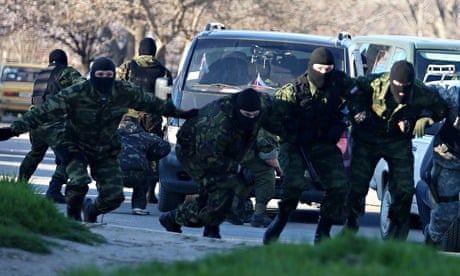
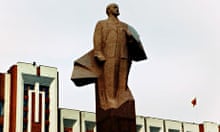
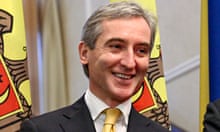
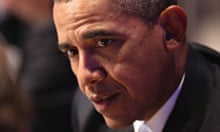
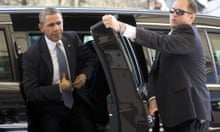
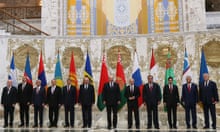
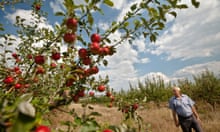
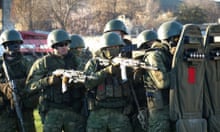

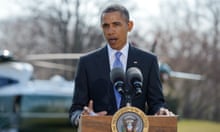

Comments (…)
Sign in or create your Guardian account to join the discussion